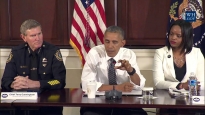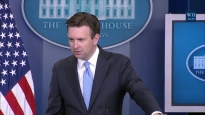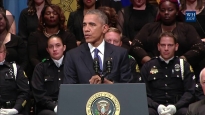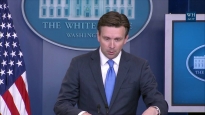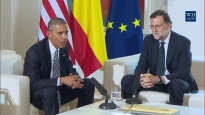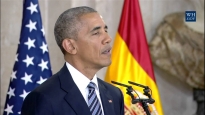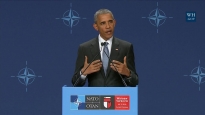President Obama, with Nancy Reagan, Signs Law for Ronald Reagan
June 3, 2009 | 6:08
The President is joined by Nancy Reagan when he signs the Ronald Reagan Centennial Commission honoring his memory. June 2, 2009 (public domain)
Remarks by the President upon signing the Ronald Reagan Centennial Commission Act
THE WHITE HOUSE
Office of the Press Secretary
___________________________________________________________
For Immediate Release June 2, 2009
REMARKS BY THE PRESIDENT
UPON SIGNING THE RONALD REAGAN CENTENNIAL COMMISSION ACT
Diplomatic Room
Office of the Press Secretary
___________________________________________________________
For Immediate Release June 2, 2009
REMARKS BY THE PRESIDENT
UPON SIGNING THE RONALD REAGAN CENTENNIAL COMMISSION ACT
Diplomatic Room
3:51 P.M. EDT
THE PRESIDENT: Well, thank you all for coming to the White House today as we commemorate the life and work of a President in the presence of those who loved him, and knew him, and respected him deeply as both a leader and as a man.
And in particular, I want to thank our special guest here today, Nancy Reagan, our former First Lady, who redefined that role in her time at the White House -- and who has, in the many years since, taken on a new role, as an advocate on behalf of treatments that hold the promise of improving and saving lives. And I should just add, she has been extraordinarily gracious to both me and Michelle during our transition here and I'm thankful for that.
There are few who are not moved by the love that Ms. Reagan felt for her husband -- and fewer still who are not inspired by how this love led her to take up the twin causes of stem cell research and Alzheimer's research. In saying a long goodbye, Nancy Reagan became a voice on behalf of millions of families experiencing the depleting, aching reality of Alzheimer's disease.
I'd also like to recognize the members of Congress who are standing alongside us, who worked so hard to pass the Ronald Reagan Centennial Commission Act, particularly Congressman Elton Gallegly, the lead sponsor of this bill. Finally, I want to thank the trustees of the Reagan Foundation who are here today as well.
This legislation -- approved by an overwhelming bipartisan majority in the House of Representatives, and passed unanimously in the Senate -- will create a commission to honor President Reagan on the 100th anniversary of his birth. And I am proud to sign it into law.
President Reagan understood that while there are often strong disagreements between parties and political adversaries -- disagreements that can be a source of conflict and bitterness -- it is important to keep in mind all that we share.
For all of the deepest of divides that exist in America, the bonds that bring us together are that much stronger. And we may see the world differently, but we must never stop seeing one another as fellow Americans -- and as patriots -- who want what is best for the country we love.
This nation was built on the basis of the principle that we are stronger, not weaker, for even the most vigorous debates -- debates that have energized our politics since the inventors of America argued over our founding documents more than two centuries ago. Through the weighing of different views we take measure of where we stand and where we must go. And the moment we fail to recognize the good in those with whom we quarrel, is the moment that we've lost sight of who we are as a people.
President Reagan helped as much as any President to restore a sense of optimism in our country, a spirit that transcended politics -- that transcended even the most heated arguments of the day. It was this optimism that allowed leaders like the President and Speaker Tip O'Neill, who held sharply different philosophies, to sit down together at the end of difficult debates as friends, and to work with one another on complex and contentious issues like Social Security. It was this optimism that the American people sorely needed during a difficult period -- a period of economic and global challenges that tested us in unprecedented ways.
In these perilous times, President Reagan had the ability to communicate directly and movingly to the American people; to understand both the hardships they felt in their lives and the hopes that they had for their country. That was powerful, that was important, and we are better off for the extraordinary leadership that he showed.
So I'm glad to have all of you here today; I'm especially glad to have Mrs. Reagan here today as we sign this bill. I'll look forward to the seeing the fruits of this commission's work, culminating in the celebration of President Reagan's life on the occasion of his 100th birthday.
And on that morning in America, we can be proud to come together as one nation -- and one people -- to honor a leader who loved this country and wanted nothing more than to see its promise fulfilled.
So thank you all very much. God bless you. God bless the United States of America. Ms. Reagan, let's go sign this bill.
(The Act is signed.)
THE PRESIDENT: Well, I think that President Reagan's signature was more legible than mine. (Laughter.) There you go.
END
3:58 P.M. EDT
THE PRESIDENT: Well, thank you all for coming to the White House today as we commemorate the life and work of a President in the presence of those who loved him, and knew him, and respected him deeply as both a leader and as a man.
And in particular, I want to thank our special guest here today, Nancy Reagan, our former First Lady, who redefined that role in her time at the White House -- and who has, in the many years since, taken on a new role, as an advocate on behalf of treatments that hold the promise of improving and saving lives. And I should just add, she has been extraordinarily gracious to both me and Michelle during our transition here and I'm thankful for that.
There are few who are not moved by the love that Ms. Reagan felt for her husband -- and fewer still who are not inspired by how this love led her to take up the twin causes of stem cell research and Alzheimer's research. In saying a long goodbye, Nancy Reagan became a voice on behalf of millions of families experiencing the depleting, aching reality of Alzheimer's disease.
I'd also like to recognize the members of Congress who are standing alongside us, who worked so hard to pass the Ronald Reagan Centennial Commission Act, particularly Congressman Elton Gallegly, the lead sponsor of this bill. Finally, I want to thank the trustees of the Reagan Foundation who are here today as well.
This legislation -- approved by an overwhelming bipartisan majority in the House of Representatives, and passed unanimously in the Senate -- will create a commission to honor President Reagan on the 100th anniversary of his birth. And I am proud to sign it into law.
President Reagan understood that while there are often strong disagreements between parties and political adversaries -- disagreements that can be a source of conflict and bitterness -- it is important to keep in mind all that we share.
For all of the deepest of divides that exist in America, the bonds that bring us together are that much stronger. And we may see the world differently, but we must never stop seeing one another as fellow Americans -- and as patriots -- who want what is best for the country we love.
This nation was built on the basis of the principle that we are stronger, not weaker, for even the most vigorous debates -- debates that have energized our politics since the inventors of America argued over our founding documents more than two centuries ago. Through the weighing of different views we take measure of where we stand and where we must go. And the moment we fail to recognize the good in those with whom we quarrel, is the moment that we've lost sight of who we are as a people.
President Reagan helped as much as any President to restore a sense of optimism in our country, a spirit that transcended politics -- that transcended even the most heated arguments of the day. It was this optimism that allowed leaders like the President and Speaker Tip O'Neill, who held sharply different philosophies, to sit down together at the end of difficult debates as friends, and to work with one another on complex and contentious issues like Social Security. It was this optimism that the American people sorely needed during a difficult period -- a period of economic and global challenges that tested us in unprecedented ways.
In these perilous times, President Reagan had the ability to communicate directly and movingly to the American people; to understand both the hardships they felt in their lives and the hopes that they had for their country. That was powerful, that was important, and we are better off for the extraordinary leadership that he showed.
So I'm glad to have all of you here today; I'm especially glad to have Mrs. Reagan here today as we sign this bill. I'll look forward to the seeing the fruits of this commission's work, culminating in the celebration of President Reagan's life on the occasion of his 100th birthday.
And on that morning in America, we can be proud to come together as one nation -- and one people -- to honor a leader who loved this country and wanted nothing more than to see its promise fulfilled.
So thank you all very much. God bless you. God bless the United States of America. Ms. Reagan, let's go sign this bill.
(The Act is signed.)
THE PRESIDENT: Well, I think that President Reagan's signature was more legible than mine. (Laughter.) There you go.
END
3:58 P.M. EDT
|
July 13, 2016
|
July 13, 2016
|
July 12, 2016
|
July 11, 2016
|
|
July 10, 2016
|
July 10, 2016
|
July 10, 2016
|
July 9, 2016
|
- &lsaquo previous
- …
- 34
- 35
- 36
- 37
- 38
- 39
- 40
- 41
- 42
- …
- next &rsaquo
